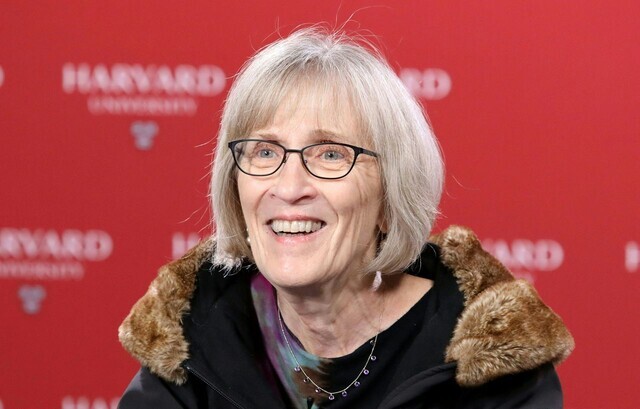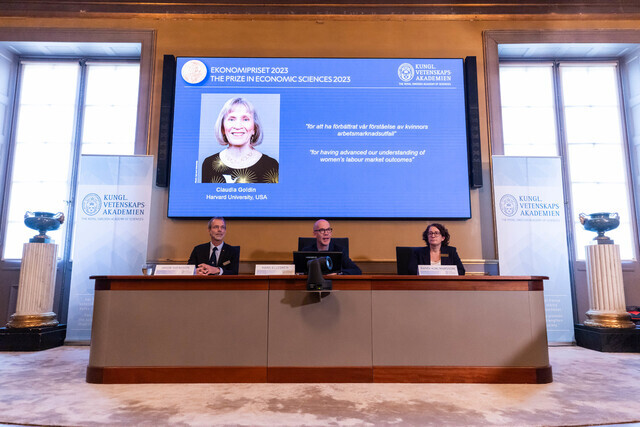hankyoreh
Links to other country sites 다른 나라 사이트 링크
“0.86”: The statistic about Korea that this year’s Nobel-winning economist knows by heart

When Harvard University professor Claudia Goldin, who was selected as the recipient of the 2023 Nobel in economics, was asked by a Korean reporter during a press conference on Monday about whether the low birth rate in Korea could be attributed to women’s work-life balance, she quickly produced a figure off the top of her head: 0.86, Korea’s total fertility rate.
She went on to say that when economies develop too quickly, they’re bound to clash with tradition.
South Korea is the only member of the Organisation for Economic Co-operation and Development with a total fertility rate below 1.0, a figure so noteworthy that Goldin knew the country’s birth rate for the first quarter of last year as provisionally determined by Statistics Korea for March 2022 and made public the following May — 0.86 — by heart.
The total fertility rate is the average number of children women of child-bearing age are estimated to have in their lifetime. The figure, which fluctuated significantly in the past, hit a record low of 0.7 during the second quarter of this year.
Goldin said that it was rare to find countries that experienced economic change as quickly as South Korea did in the second half of the 20th century, as are countries that transformed into one concentrated in one city, bringing attention to South Korea’s rapid economic growth.
While remarking that the US underwent such changes over a much longer period of time, enabling past generations to adjust to changes brought on by new generations, Goldin pointed out that there was less room for such adjustments in South Korea and Japan. Her observation indicates that rapid economic growth led to higher education levels and increased social advancement for women, despite which social systems and culture didn’t keep up, intensifying the problem of low birth.

Goldin also noted South Korea’s corporate culture. She diagnosed that low birth “is not simply a problem of what goes on in the family and the home,” assessing that it is a problem of workplaces that “haven’t caught up” with rapid changes either.
Goldin suggested that the older generation and men should change their outlook in order to solve the problem of low birth. Arguing that the problem is very hard to provide an answer to and difficult to change in a short period of time, as many issues are interlinked, the economist stressed the need to educate people who can influence the older generation, especially their sons rather than their daughters. Social and cultural views must be changed through continued education, her reasoning went.
Born in New York in 1946, Goldin studied microbiology at Cornell University and received her master’s and doctoral degree in economics from the University of Chicago. In 1990, she became the first woman professor to be tenured in Harvard University’s economics department. She currently teaches economic history and the economics of work and family at the university.
Goldin researched topics such as the history of women’s quest for career and family, the impact of the birth control pill on women’s careers and marriage, and the reason women’s college entrance rate is higher than that of men.
Her book “Career and Family,” which was published in October 2021, was translated into Korean. In this book, Goldin traces the reason behind the gender wage gap in the past century by categorizing college-educated women in the US into five different generations. She argues that the top reason for a gender wage gap between men and women of the same education level is “greedy work.” When couples have a child, men and women divide their labor, the former usually remaining in workplaces that demand them to work long hours and respond to irregular schedules in unrelenting intervals while the latter chooses a flexible job that allows them to leave the office whenever something urgent happens, worsening the wage gap.
By Joh Yun-yeong, staff reporter
Please direct questions or comments to [english@hani.co.kr]

Editorial・opinion
![[Editorial] Perilous stakes of Trump’s rhetoric around US troop pullout from Korea [Editorial] Perilous stakes of Trump’s rhetoric around US troop pullout from Korea](https://flexible.img.hani.co.kr/flexible/normal/500/300/imgdb/original/2024/0509/221715238827911.jpg) [Editorial] Perilous stakes of Trump’s rhetoric around US troop pullout from Korea
[Editorial] Perilous stakes of Trump’s rhetoric around US troop pullout from Korea![[Guest essay] Preventing Korean Peninsula from becoming front line of new cold war [Guest essay] Preventing Korean Peninsula from becoming front line of new cold war](https://flexible.img.hani.co.kr/flexible/normal/500/300/imgdb/original/2024/0507/7217150679227807.jpg) [Guest essay] Preventing Korean Peninsula from becoming front line of new cold war
[Guest essay] Preventing Korean Peninsula from becoming front line of new cold war- [Column] The state is back — but is it in business?
- [Column] Life on our Trisolaris
- [Editorial] Penalties for airing allegations against Korea’s first lady endanger free press
- [Editorial] Yoon must halt procurement of SM-3 interceptor missiles
- [Guest essay] Maybe Korea’s rapid population decline is an opportunity, not a crisis
- [Column] Can Yoon steer diplomacy with Russia, China back on track?
- [Column] Season 2 of special prosecutor probe may be coming to Korea soon
- [Column] Park Geun-hye déjà vu in Yoon Suk-yeol
Most viewed articles
- 1Behind-the-times gender change regulations leave trans Koreans in the lurch
- 260% of young Koreans see no need to have kids after marriage
- 3Family that exposed military cover-up of loved one’s death reflect on Marine’s death
- 4Yoon’s revival of civil affairs senior secretary criticized as shield against judicial scrutiny
- 5Japan says its directives were aimed at increasing Line’s security, not pushing Naver buyout
- 6[Guest essay] Preventing Korean Peninsula from becoming front line of new cold war
- 7Unexpected rate of AI development requires timely discussion of side effects
- 8[Guest essay] Maybe Korea’s rapid population decline is an opportunity, not a crisis
- 9S. Korean first lady likely to face questioning by prosecutors over Dior handbag scandal
- 10Yoon’s broken-compass diplomacy is steering Korea into serving US, Japanese interests